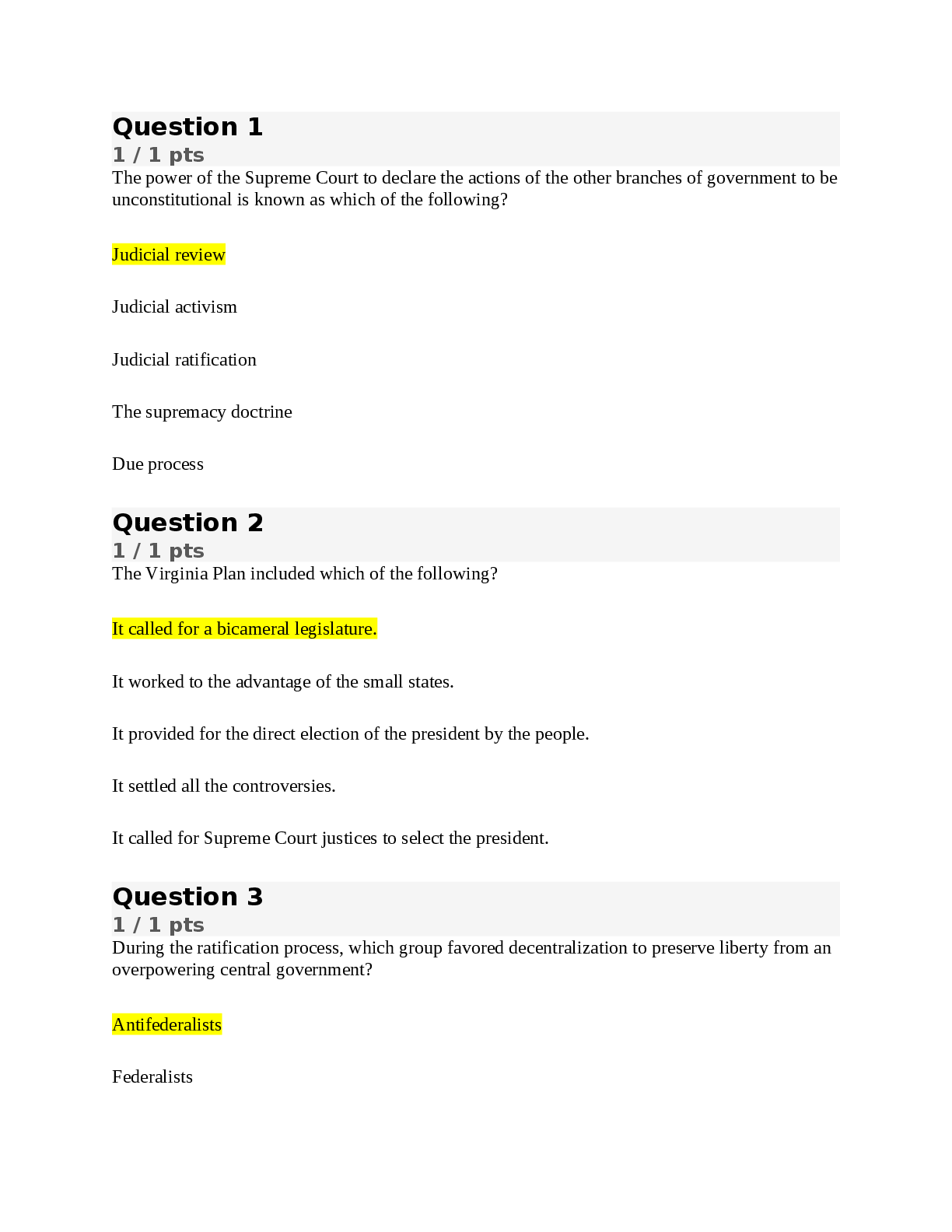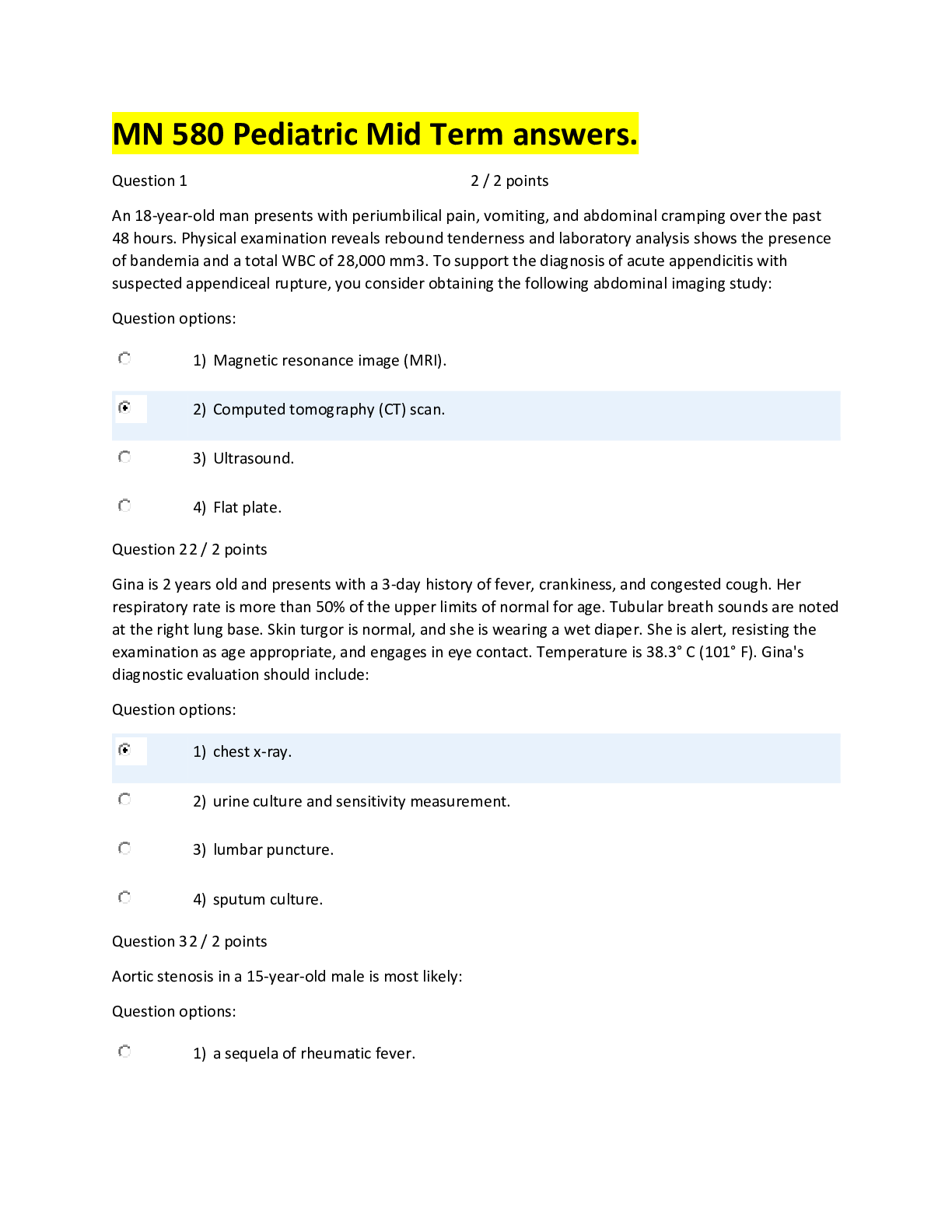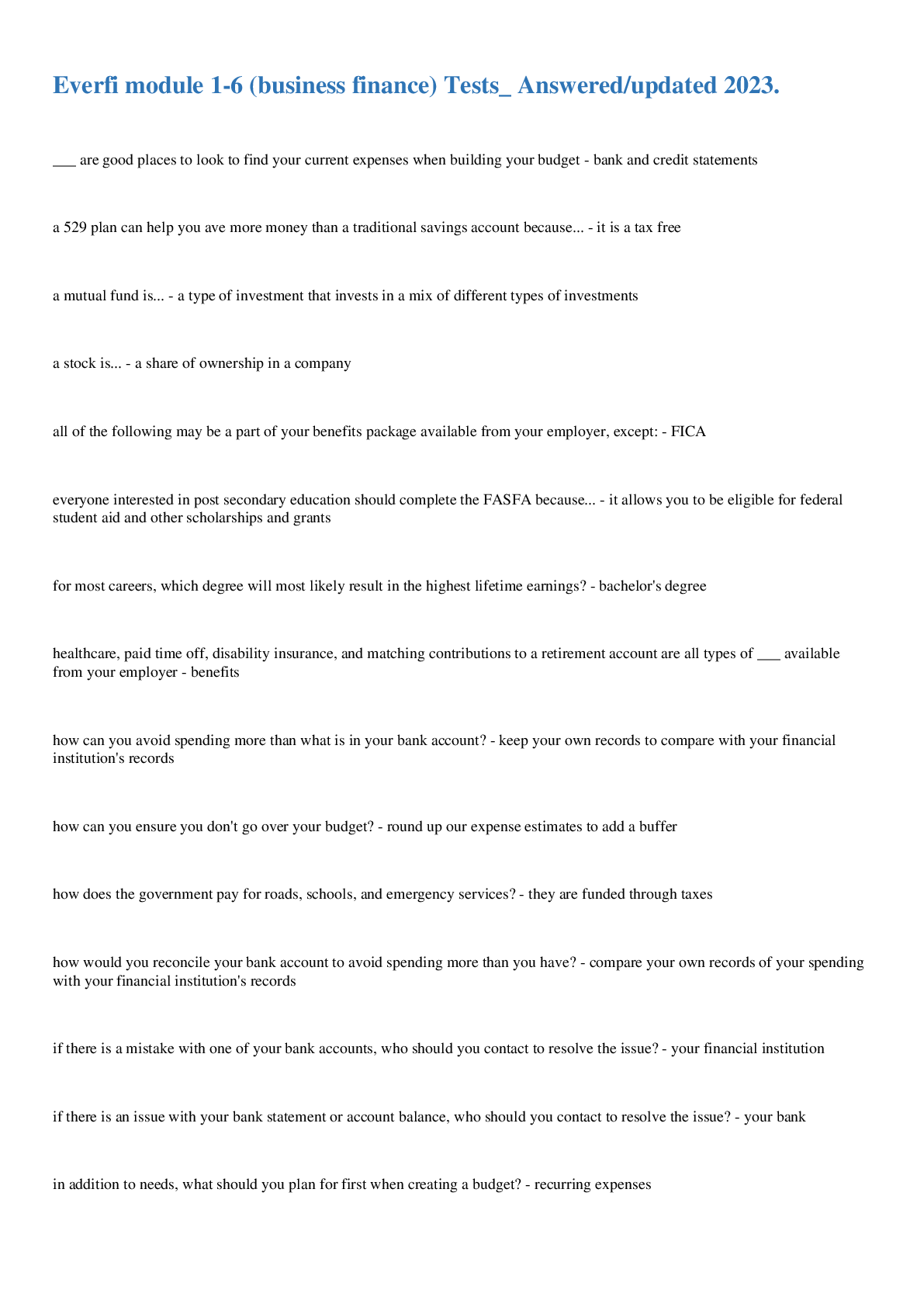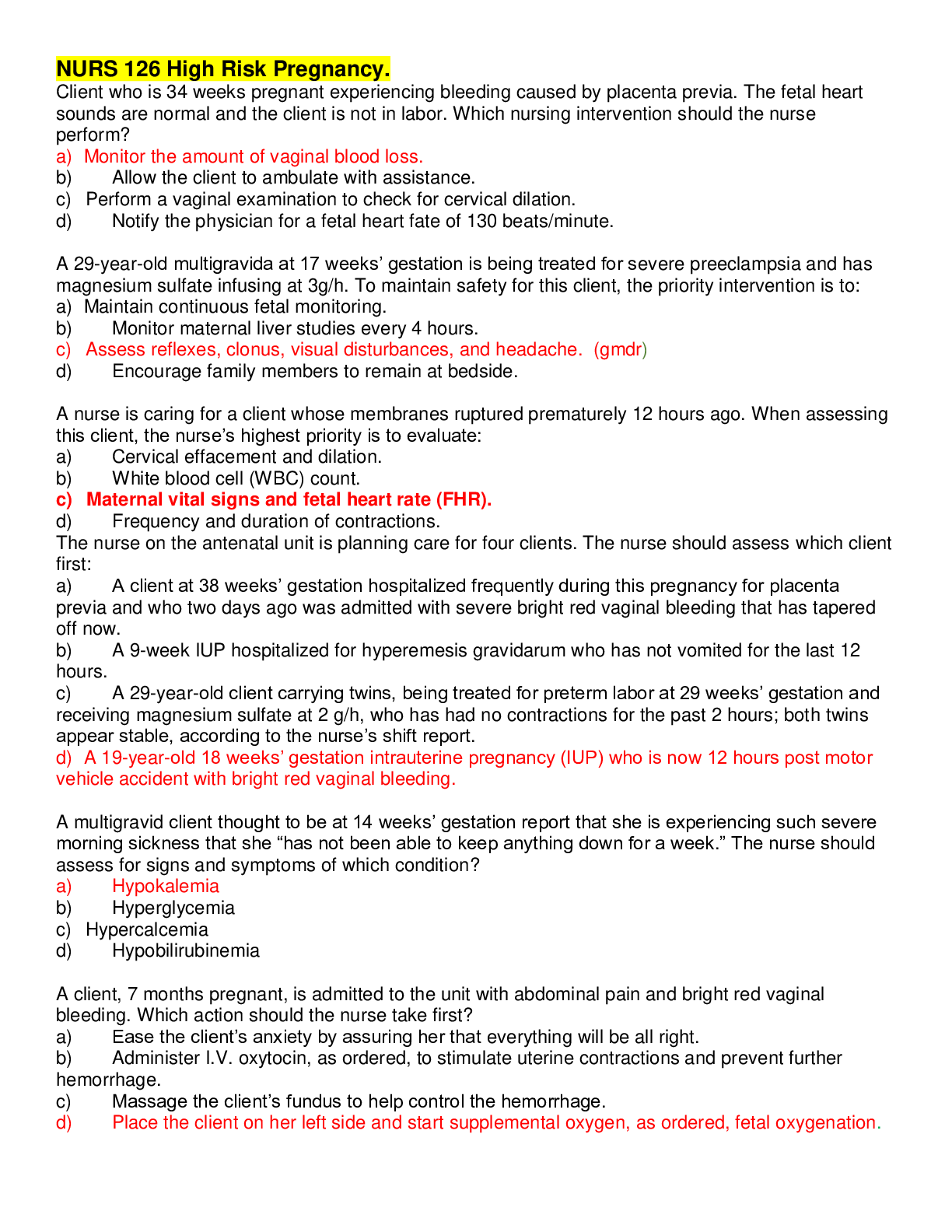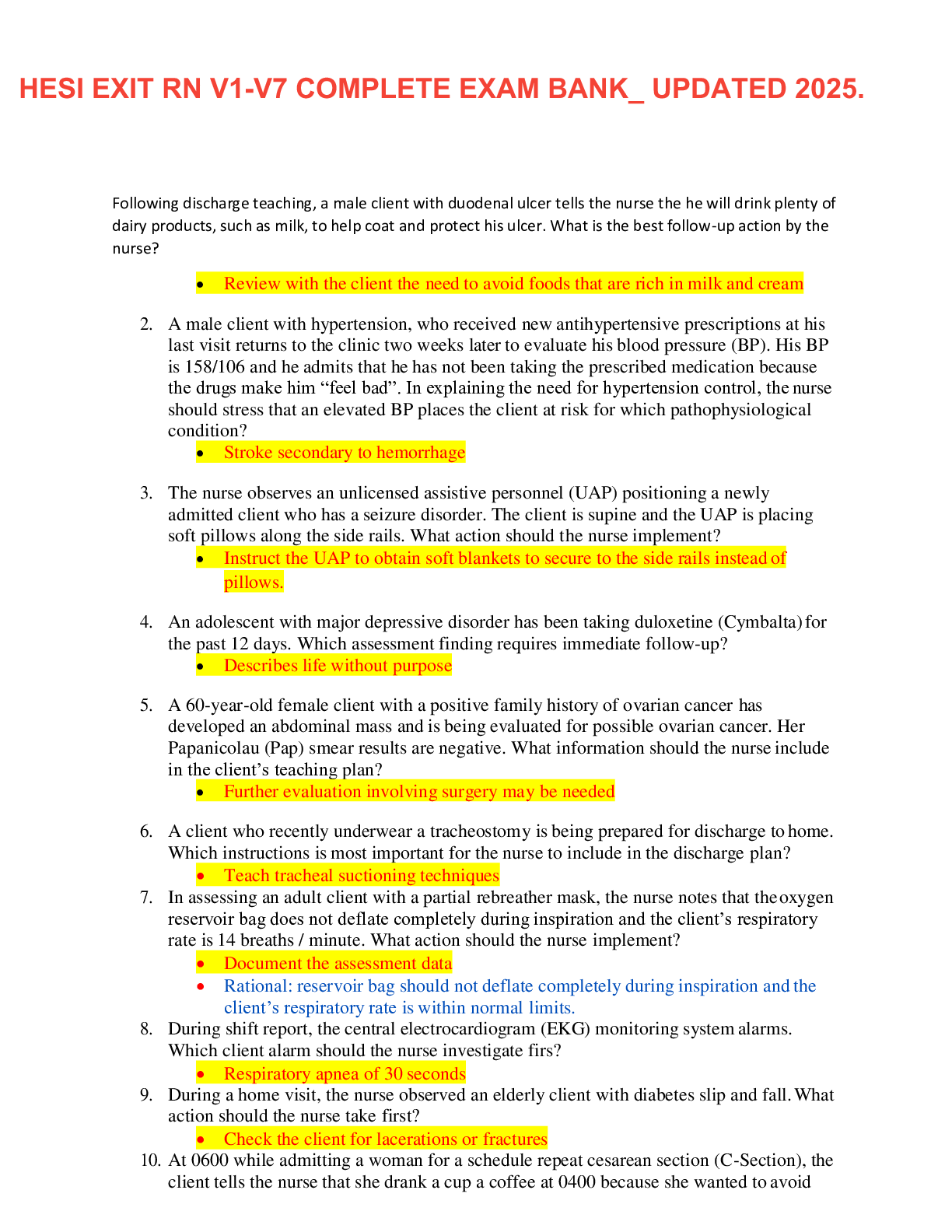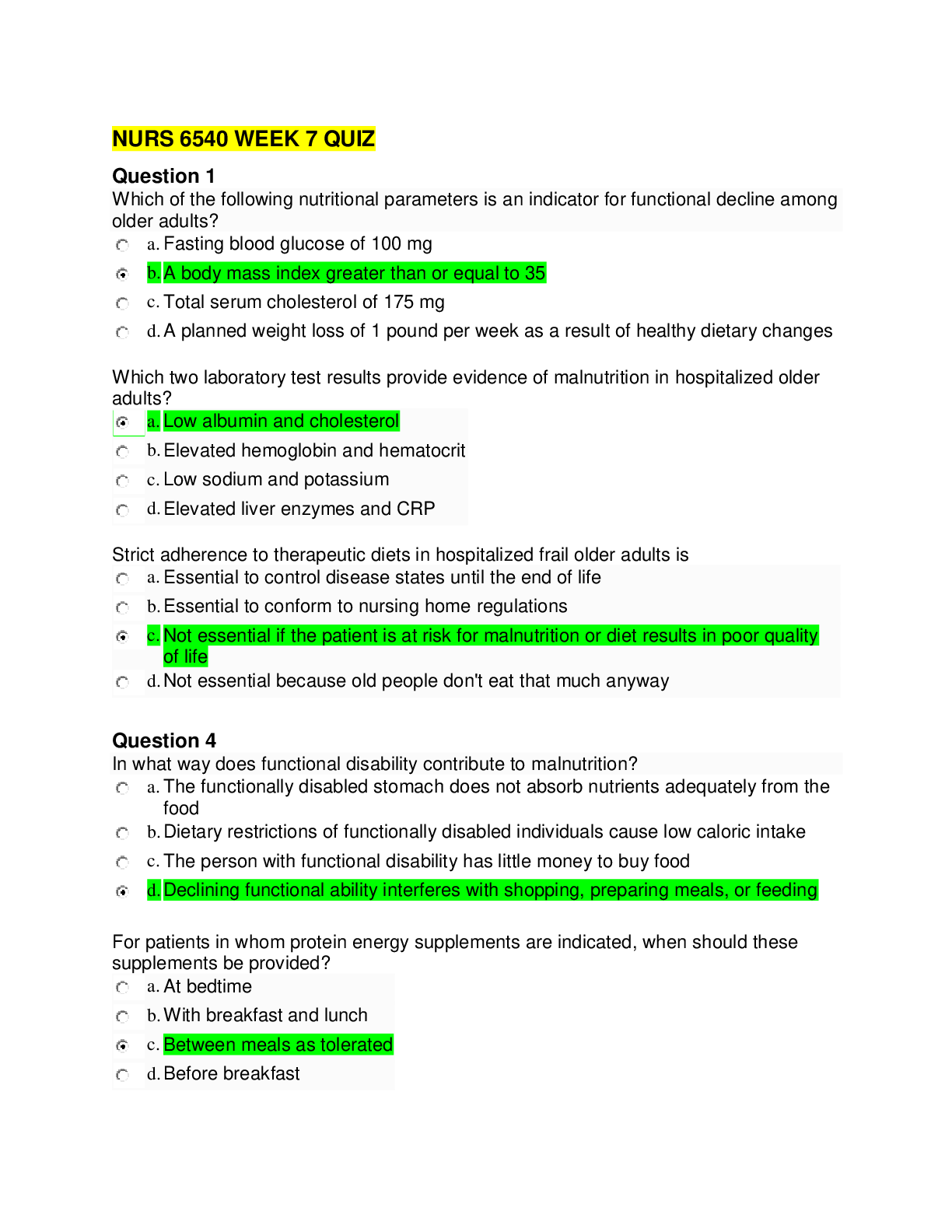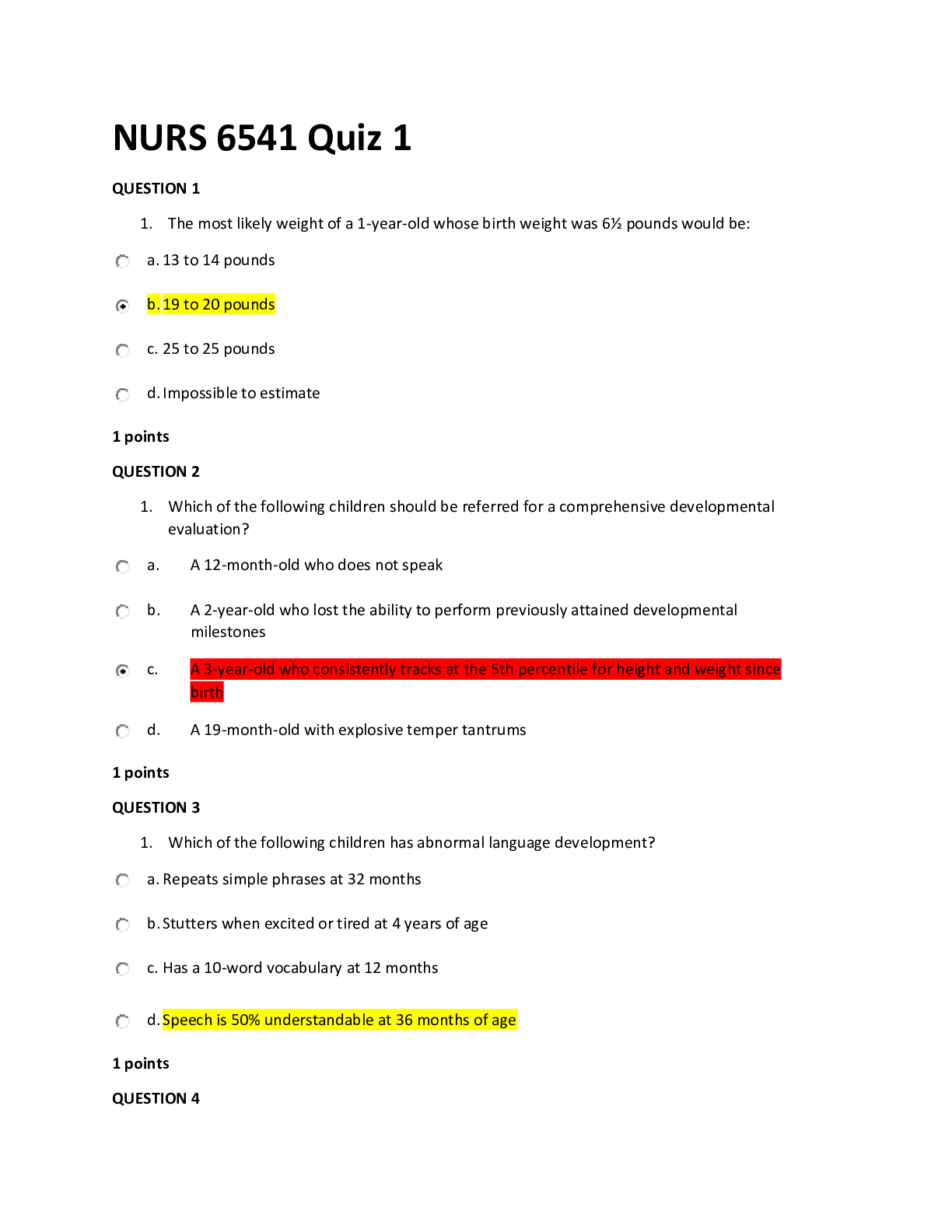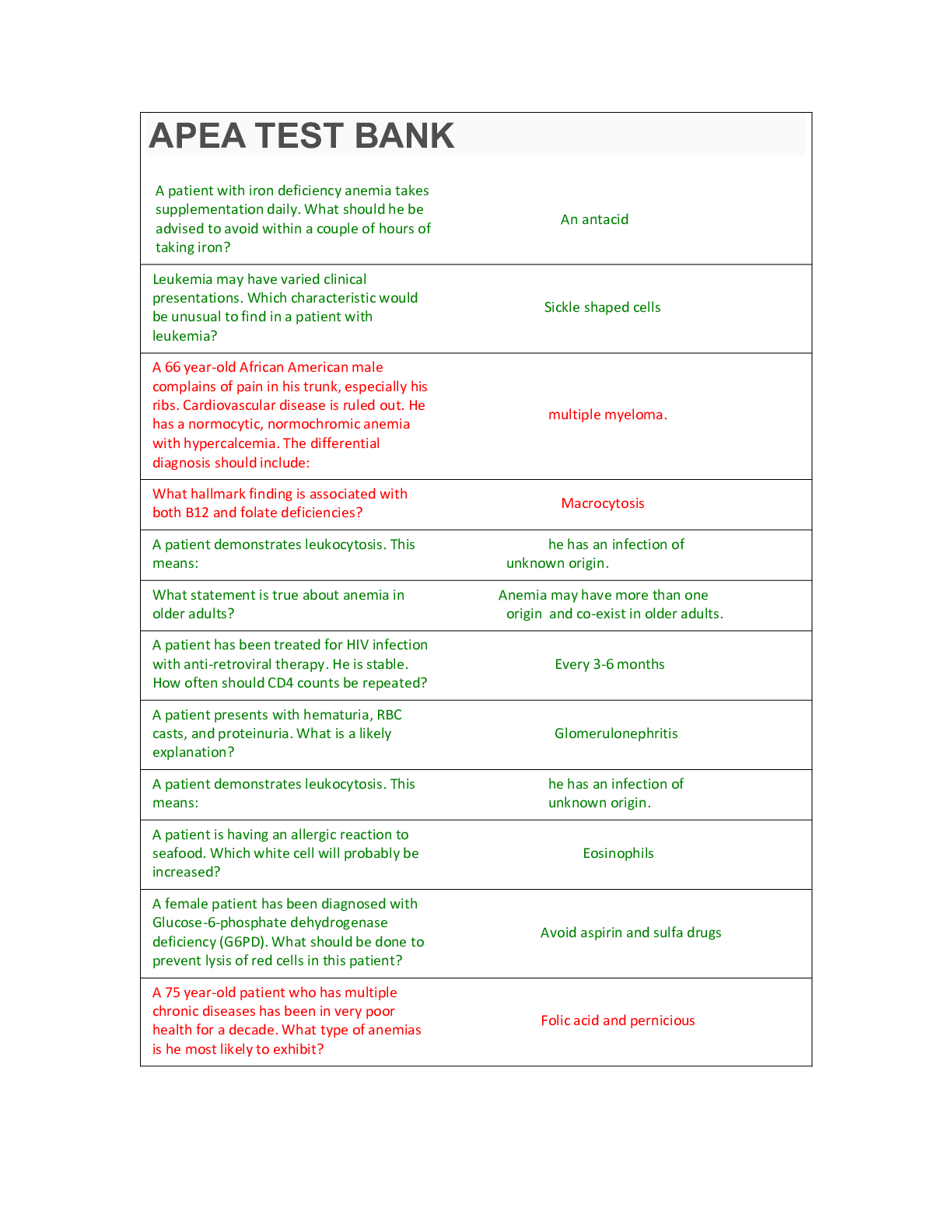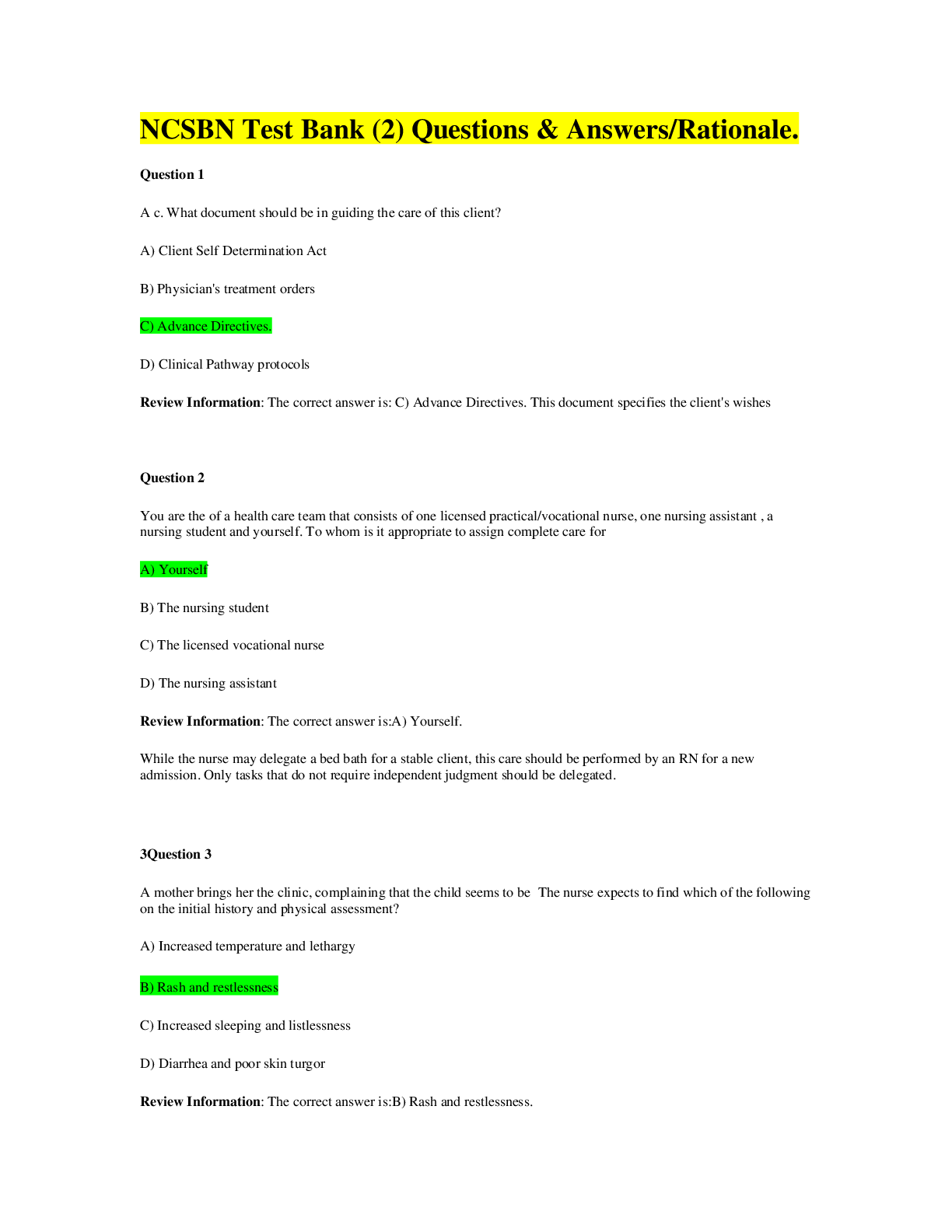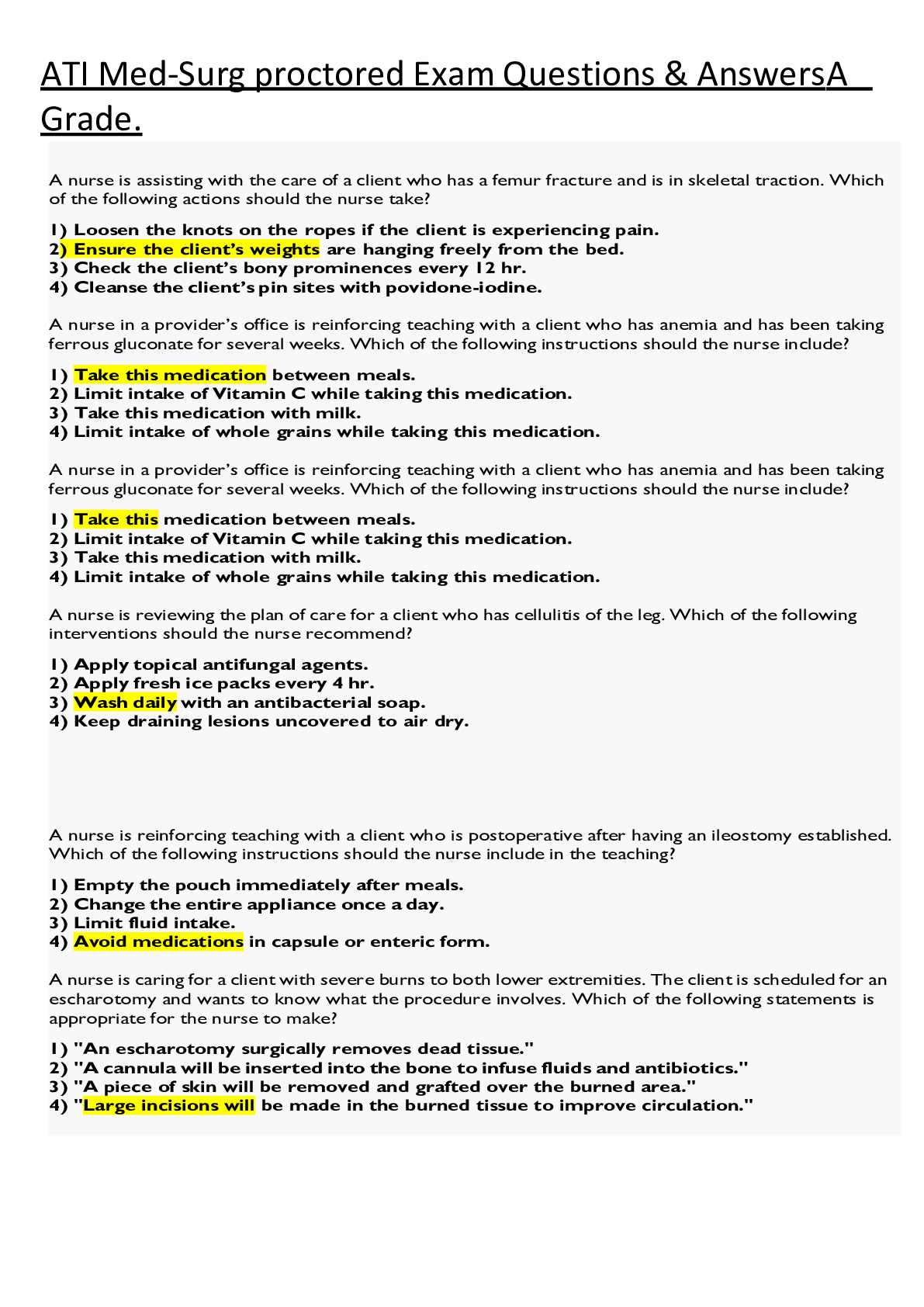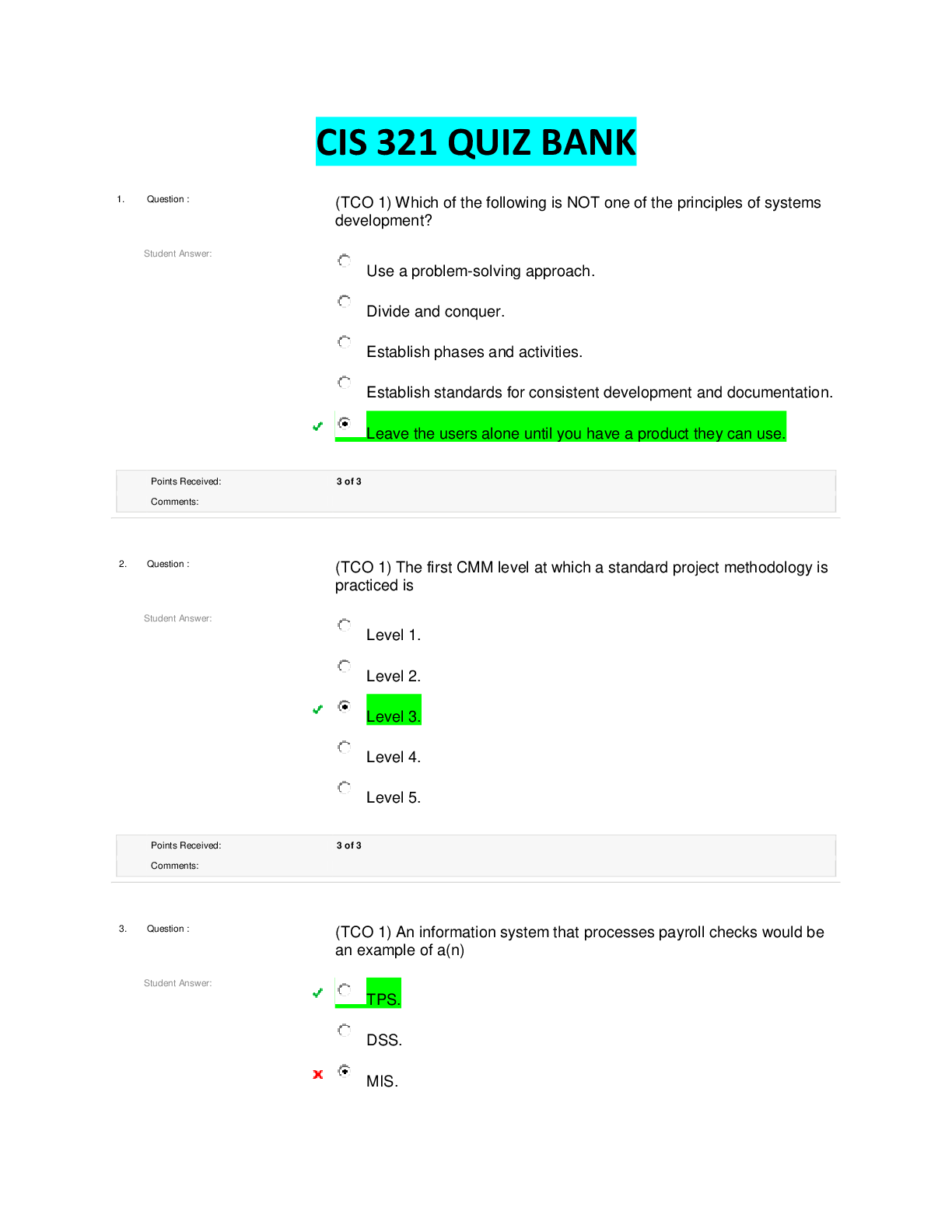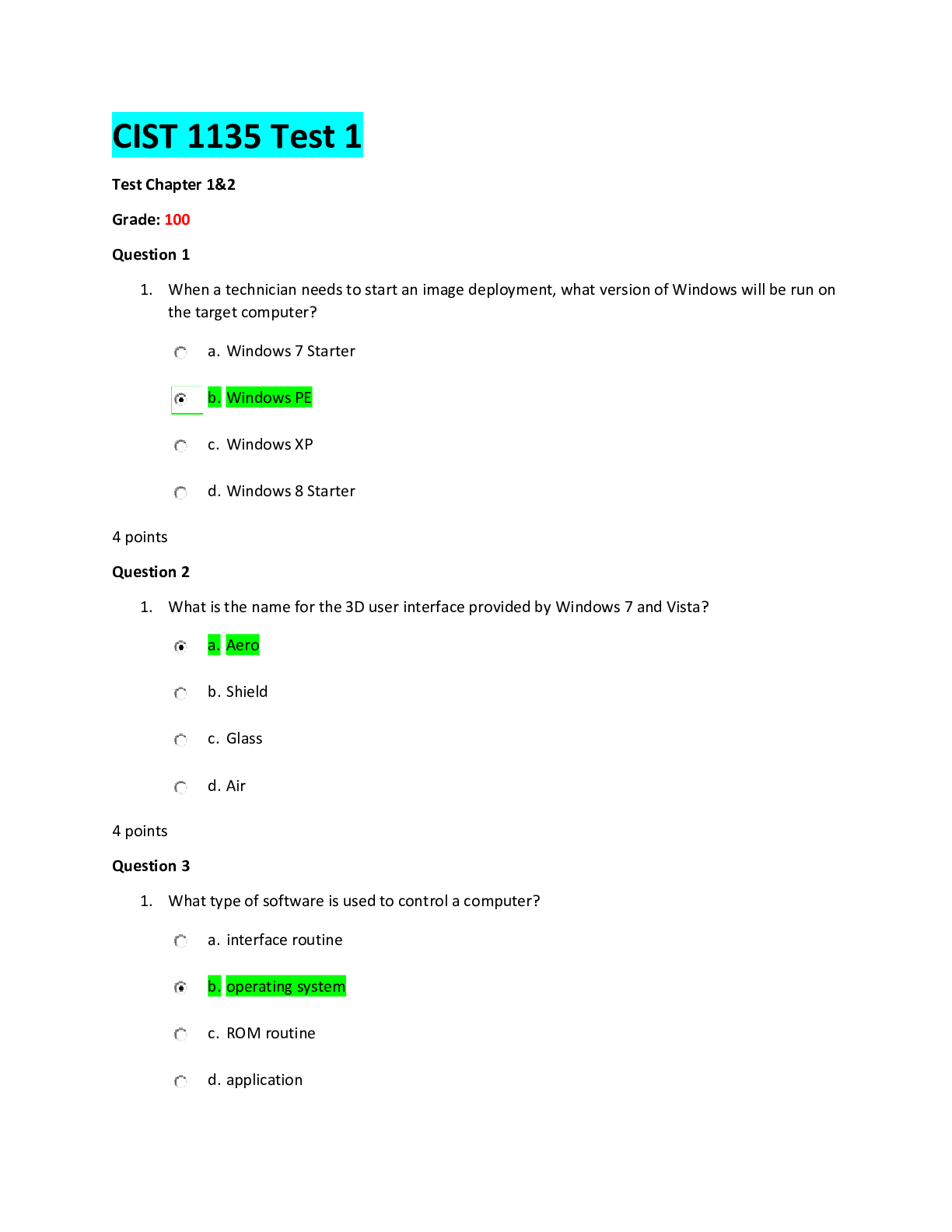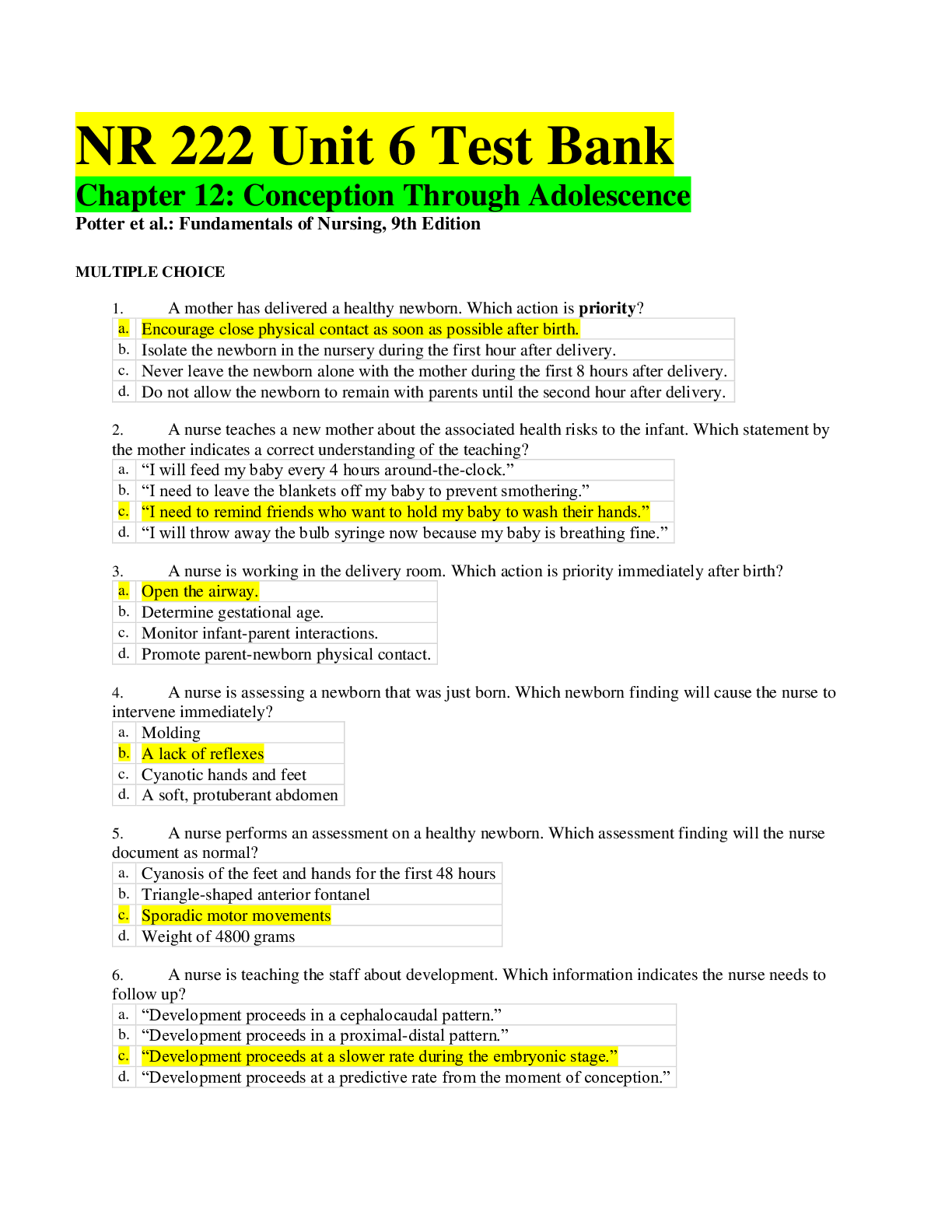Government > QUESTIONS & ANSWERS > Liberty University GOVT 220|Quiz 1 Week 7 Module 7 Political Parties|100% Questions & Answers Update (All)
Liberty University GOVT 220|Quiz 1 Week 7 Module 7 Political Parties|100% Questions & Answers Updated 2025/2026.
Document Content and Description Below
GOVT 220 Quiz: Political Parties • Covers the Chapter 9 material from Module 7: Week 7. Question 1 1 / 1 pts What kind of party is the Populist Party? Ideological Single-issue Economic protest ... Factional Consensual Question 2 1 / 1 pts The American electoral system can be described as both a single-member plurality system and which of the following? Unitary-party system Two-party system Multiparty system Tri-party system Single-party system Question 3 1 / 1 pts Primary elections were developed to limit the power of whom or what? The people Party bosses Congress The president The Supreme Court IncorrectQuestion 4 0 / 1 pts For the most part, a majority of Americans believe that Republicans are better than Democrats at handling which issue? Health care The environment Taxes Foreign trade The economy Question 5 1 / 1 pts What are super-delegates? Elected officials and party leaders who are not required to pledge themselves in advance to a presidential candidate Delegates representing special interest caucuses, such as those organized to represent Black or LGBTQ persons. Delegates at large who are chosen by a vote of the national party leadership Delegates chosen by primary elections and grassroots caucuses Delegates who received more than 80% of the vote necessary to achieve their status Question 6 1 / 1 pts Which of the following statements about voter behavior is incorrect? Typically, a majority of Democrats vote for the Democratic candidate. Typically, a majority of Republicans vote for the Republican candidate. Typically, a majority of Independents vote for the Independent candidate. Typically, a plurality of Independents vote for either the Democratic or Republican candidate. Typically, most Independents vote for only the Republican candidate. Question 7 1 / 1 pts Which of the following is true of a winner-take-all electoral system? The candidate who gets the most votes wins. One must get a majority of votes cast to win. Votes are allocated on a proportional basis. Only parties receiving more than 5% of the vote are allocated seats. A party must have competed in a previous election to be placed on the ballot. Question 8 1 / 1 pts The Republican Party was established to deal with which of the following issues? Taxes Slavery School prayer Free trade Silver Question 9 1 / 1 pts Which of the following best describes George Washington's views on political parties? A necessity for the functioning of democracy A tradition from colonial times that would always exist A threat to national unity and popular government A legitimate means for interest groups to attempt to gain control of the government A vestige of politics under Great Britain and thus a thing of the past Question 10 1 / 1 pts For the most part, a majority of Americans believe that Democrats are better than Republicans at handling which issue? Health care Crime National defense Foreign trade The economy Question 11 1 / 1 pts What is one way that minor parties can have an influence over politics? They can force major parties to adopt or incorporate their issue(s). They often win congressional seats. They pull the parties to a moderate position. They pull the parties to the extreme. They have had no major impact on politics. Question 12 1 / 1 pts What kind of party is the Socialist Party? Single-issue Ideological Economic protest Factional Consensual Question 13 1 / 1 pts The Hatch Act allows federal civil service employees to do what? Serve as party officers Solicit campaign donations Make campaign contributions Serve as a delegate to a party convention Endorse partisan candidates Question 14 1 / 1 pts What is the process of attracting key party and interest group figures to a candidate called? Open primary Caucus National convention Invisible primary Straw poll Question 15 1 / 1 pts Which of the following describes the formation of the modern Republican Party? It was formed as a response to the Seneca Falls Convention for women’s rights. It was formed from a coalition of antislavery factions. It was formed as an outgrowth of the Southern Whigs. It was formed as the party supporting Midwestern interests. It was formed during the era of good feelings. Question 16 1 / 1 pts Research on party identification has found that about how many selfidentified Independents are truly independent? Nearly all Roughly three quarters Roughly half Less than half Less than a quarter Question 17 1 / 1 pts In most states, how are candidates for office chosen? Open elections Party leaders Primary elections Conventions Delegations Question 18 1 / 1 pts Which party, as a faction of the Republican Party, was opposed to the patronage system and favored nonpartisan elections at the city level? Know-Nothings Whigs America First Jacksonians Progressives Question 19 1 / 1 pts What perceptions do Americans hold about the two parties? They believe the two parties are very good at compromise. They see no real difference between the parties. They perceive clear differences between the two major parties. They perceive the parties as unnecessary. They believe the parties help get a significant amount of legislation passed in Congress. Question 20 1 / 1 pts What is typically the first step in electing candidates? Convincing good candidates to run Deciding which elections to contest Winning the election Raising money for the campaign Consolidating the party leadership Question 21 1 / 1 pts If party elites and voters disagree on the best choice of presidential candidate, who usually wins? The voters will likely get their way. The party leaders will likely get their way. The party leaders will ax the voters’ choice before it can come to a vote. The party leaders will listen to the voters and back down. The voters will listen to the party leaders and back down. Question 22 1 / 1 pts Which party won most presidential elections from 1932, during the Great Depression, through the election of 1964, when the turbulent 1960s created the environment for a major political realignment? Democratic Whig Populist Republican Libertarian Question 23 1 / 1 pts Given the U.S. federal system, how do parties in the United States compare to their European counterparts? More ideological Less ideological More aggressive More centralized More decentralized Question 24 1 / 1 pts What term is used to describe voters adjusting their long-term allegiance from one party to another in response to ideological changes? Dealignment Centralization Liberalization Party alignment Realignment Question 25 1 / 1 pts The decline of political machines was caused in part by what? The Supreme Court’s interpretation of the commerce clause The general decline in voter turnout The increasing education and sophistication of voters Economic depression in major metropolitan areas Trends in immigration Question 26 1 / 1 pts A political party is a group of individuals who do which of the following? Answer strictly to designated party leaders Agree on all policy issues Obtain positions of official power Organize to win elections and operate the government Pay monthly dues to a collective organization Question 27 1 / 1 pts Which of the following statements best describes the patronage system? Another name for representation Only occurred at the national level Ended by the time of the Civil War Rewarding faithful followers with government jobs and contracts Guarantees mentors for newly elected officials Question 28 1 / 1 pts Which of the following statements about the formula by which delegates to the nominating conventions are apportioned is correct? Both Democrats and Republicans give extra delegates to large states. Both Democrats and Republicans give extra delegates to loyal states. The Democrats and Republicans use different formulas. The formula reflects a movement to the center by both Democrats and Republicans. Formulas have had no noticeable impact on the selection of delegates to the conventions. Question 29 1 / 1 pts Which of the following best describes political parties during the period leading up to the Civil War? The Whig Party split over the issue of slavery. Antislavery factions of many parties coalesced to form the Republican Party. The Federalist Party experienced a resurgence of support. The Whig Party split over the issue of slavery, and the antislavery factions of many parties coalesced to form the Republican Party. Antislavery factions of many parties coalesced to form the Republican Party, and the Federalist Party experienced a resurgence of support. Question 30 1 / 1 pts What is a voter’s stable, long-term attachment to a political party called? Political ideology Partisan identification Impressionable years Social movement Social identity Quiz Score: 29 out of 30 [Show More]
Last updated: 3 weeks ago
Preview 1 out of 14 pages
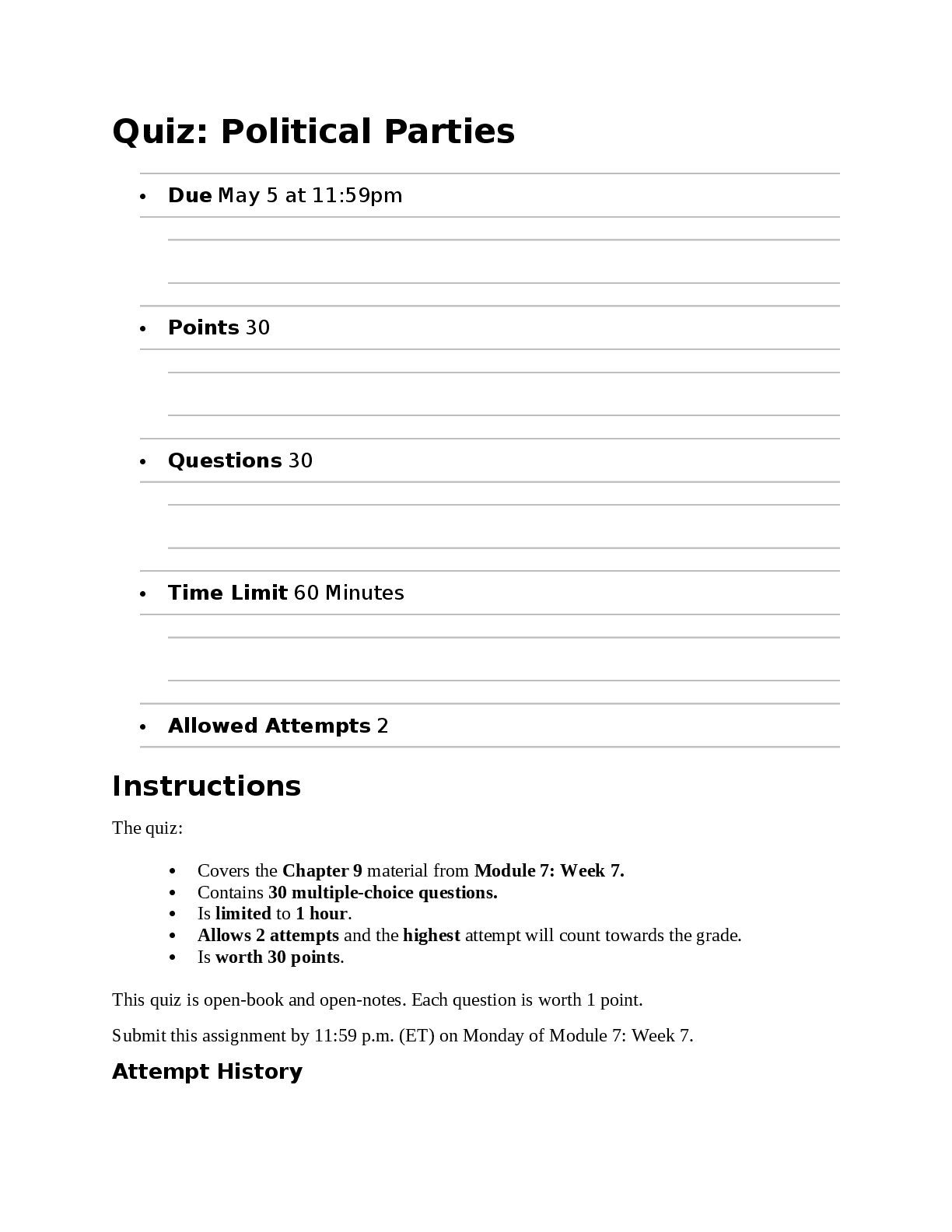
Buy this document to get the full access instantly
Instant Download Access after purchase
Buy NowInstant download
We Accept:

Reviews( 0 )
$10.50
Can't find what you want? Try our AI powered Search
Document information
Connected school, study & course
About the document
Uploaded On
Jul 09, 2025
Number of pages
14
Written in
Additional information
This document has been written for:
Uploaded
Jul 09, 2025
Downloads
0
Views
7
